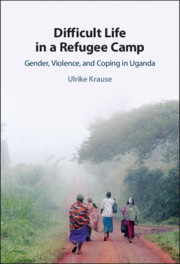Book contents
- Difficult Life in a Refugee Camp
- Difficult Life in a Refugee Camp
- Copyright page
- Contents
- Figures and Images
- Acknowledgments
- Maps
- 1 Introduction
- 2 Gender-Based Violence in the Camp and Beyond
- 3 Humanitarian Aid and the Camp Landscape
- 4 Changing Gender Relations in the Camp
- 5 Coping with the Difficult Life in the Refugee Camp
- 6 Conclusions
- Bibliography
- Index
5 - Coping with the Difficult Life in the Refugee Camp
Published online by Cambridge University Press: 30 July 2021
- Difficult Life in a Refugee Camp
- Difficult Life in a Refugee Camp
- Copyright page
- Contents
- Figures and Images
- Acknowledgments
- Maps
- 1 Introduction
- 2 Gender-Based Violence in the Camp and Beyond
- 3 Humanitarian Aid and the Camp Landscape
- 4 Changing Gender Relations in the Camp
- 5 Coping with the Difficult Life in the Refugee Camp
- 6 Conclusions
- Bibliography
- Index
Summary
How do refugees in Uganda’s Kyaka II cope with the violence, difficult camp conditions, and manifold uncertainties? This chapter explores the relationship between refugees’ coping strategies and the presenting issues, drawing on Lister’s agency theory. The first part revolves around practices to deal with risks of violence during conflict, flight, and encampment. It is argued that flight from violence during conflict represents a conscious decision rather than a passive reaction, and thus a protection strategy. Moreover, the role of voice and silence as well as mutual support, raising awareness in communities, and involvement in decision-making structures are explored as strategies consciously adopted to counter the prevalent risks faced during encampment. The second part addresses economic, social, political, and cultural practices to improve lives and livelihoods in the camp. This includes pursuing economic income by using or bypassing humanitarian regulations, creating normalcy and spheres of belonging despite multidimensional uncertainties, and consciously claiming rights. Hope for and belief in a better future is revealed not only to be a coping strategy but also a means of dealing with difficulties. This also includes belief in witchcraft as a way of making sense of problematic developments.
Keywords
- Type
- Chapter
- Information
- Difficult Life in a Refugee CampGender, Violence, and Coping in Uganda, pp. 188 - 240Publisher: Cambridge University PressPrint publication year: 2021

